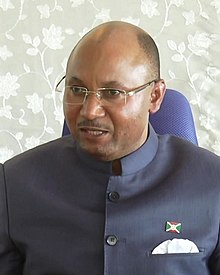The arrest of former Burundian Prime Minister Alain-Guillaume Bunyoni by the authorities after being wanted by the courts without any reasons being communicated has raised concerns about the continued crackdown on political opposition and dissent in Burundi.
Bunyoni had been the Prime Minister of Burundi since June 2020, and he was removed from office on September 7, 2021, by President Ndayishimiye, who accused those who believed themselves “almighty” of attempting a coup d’etat and sabotaging his action. Bunyoni had long been considered the regime’s true number two since the political crisis of 2015 and the leader of the hardliners among the generals working behind the scenes of power.
Burundi‘s Interior Minister, Martin Niteretse, had announced at a press conference on Wednesday that Bunyoni was wanted by the courts, and that several searches had been carried out without being able to locate him, claiming to ignore the reasons for these operations. However, a senior security official, who requested anonymity, told AFP that Bunyoni was arrested very quickly by the National Intelligence Service.
On Saturday, the National Independent Commission for Human Rights (CNIDH) and a senior security official announced that Bunyoni had been arrested. The CNIDH made a visit to him and reported that he was doing well and had not suffered any act of torture or other abuse since his arrest.
The arrest of Bunyoni has led to concerns about the government’s continued crackdown on political opposition and dissent in Burundi. The CNIDH called on the authorities to respect the rule of law and due process in Bunyoni’s case and urged the government to release any political prisoners and respect the rights of all citizens.
Who is Alain-Guillaume Bunyoni?
Alain-Guillaume Bunyoni is a former Prime Minister of Burundi who had been wanted by the courts without any official explanation for several days. He was removed from his position as Prime Minister in September 2020 by President Evariste Ndayishimiye, who accused him of being involved in a coup d’état attempt. Bunyoni was believed to be the true number two in the regime, leading the hardline faction of generals behind the scenes.
The international community has also expressed concern about the human rights situation in Burundi. The European Union, for example, has suspended its financial assistance to the country, citing the government’s failure to respect human rights and the rule of law. The United Nations has also called on the Burundian government to respect human rights and ensure that those responsible for human rights violations are held accountable.
Burundi, which is landlocked in the Great Lakes region, is the poorest country in the world in terms of GDP per capita according to the World Bank, which estimates that 75% of its twelve million inhabitants live below the poverty line. Since its independence in 1962, Burundi has been the scene of numerous massacres and conflicts between the Hutu and Tutsi communities, respectively estimated at 85% and 14% of its population.
The political crisis in Burundi dates back to 2015 when then-President Pierre Nkurunziza ran for a third term, which was seen as a violation of the constitution. The move sparked mass protests, and the government responded with a brutal crackdown on dissent, leading to an exodus of refugees and political repression. Nkurunziza died suddenly in June 2020, and Ndayishimiye took over as president, promising to usher in a new era of peace and reconciliation.
Tthe arrest of Bunyoni has cast doubts on the government’s commitment to respecting human rights and the rule of law. The continued crackdown on political opposition and dissent in Burundi has led to a deterioration of the human rights situation in the country, which has been described as “disastrous” by a UN commission of inquiry. The arrest of Bunyoni has further underscored the need for the Burundian government to respect human rights and ensure that those responsible for human rights violations are held accountable.




